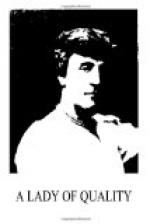“That you had not,” was her clear-worded answer. “That is a later thought sprung up since you have seen my face. ’Twas quick—for you—but not quick enough.” And the smile in her eyes was maddening. “You thought to see a woman crushed and weeping, her beauty bent before you, her locks dishevelled, her streaming eyes lifted to Heaven—and you—with prayers, swearing that not Heaven could help her so much as your deigning magnanimity. You have seen women do this before, you would have seen me do it—at your feet—crying out that I was lost—lost for ever. That you expected! ’Tis not here.”
Debauched as his youth was, and free from all touch of heart or conscience—for from his earliest boyhood he had been the pupil of rakes and fashionable villains—well as he thought he knew all women and their ways, betraying or betrayed—this creature taught him a new thing, a new mood in woman, a new power which came upon him like a thunderbolt.
“Gods!” he exclaimed, catching his breath, and even falling back apace, “Damnation! you are not a woman!”
She laughed again, weaving her roses, but not allowing that his eyes should loose themselves from hers.
“But now, you called me a goddess and spoke of Olympian heights,” she said; “I am not one—I am a woman who would show other women how to bear themselves in hours like these. Because I am a woman why should I kneel, and weep, and rave? What have I lost—in losing you? I should have lost the same had I been twice your wife. What is it women weep and beat their breasts for—because they love a man—because they lose his love. They never have them.”
She had finished the wreath, and held it up in the sun to look at it. What a strange beauty was hers, as she held it so—a heavy, sumptuous thing—in her white hands, her head thrown backward.
“You marry soon,” she asked—“if the match is not broken?”
“Yes,” he answered, watching her—a flame growing in his eyes and in his soul in his own despite.
“It cannot be too soon,” she said. And she turned and faced him, holding the wreath high in her two hands poised like a crown above her head—the brilliant sun embracing her, her lips curling, her face uplifted as if she turned to defy the light, the crimson of her cheek. ’Twas as if from foot to brow the woman’s whole person was a flame, rising and burning triumphant high above him. Thus for one second’s space she stood, dazzling his very eyesight with her strange, dauntless splendour; and then she set the great rose-wreath upon her head, so crowning it.
“You came to see me,” she said, the spark in her eyes growing to the size of a star; “I bid you look at me—and see how grief has faded me these past months, and how I am bowed down by it. Look well—that you may remember.”
“I look,” he said, almost panting.
“Then,” she said, her fine-cut nostril pinching itself with her breath, as she pointed down the path before her—“go!—back to your kennel!”




